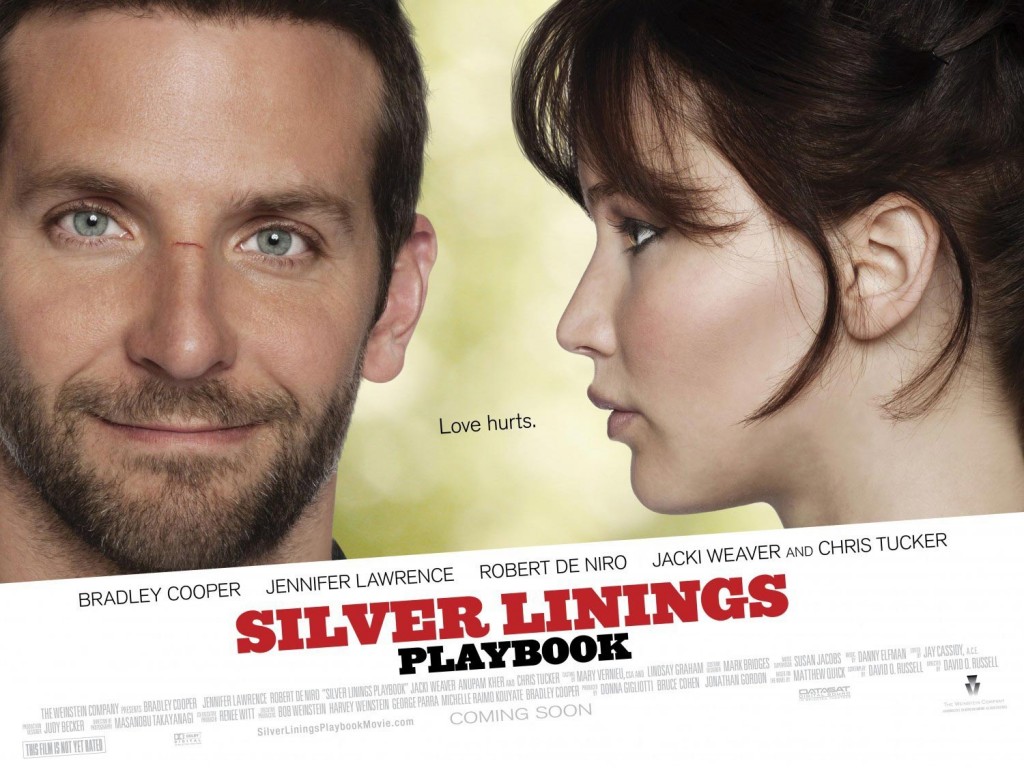By Brenna Walton
Bradley Cooper and Jennifer Lawrence are electric together, but the rest of the characters leave the viewer wanting more.

Like its main character, “Silver Linings Playbook” suffers from bipolar disorder. When it works, it’s vibrant. When it doesn’t, it’s sad and confused.
Based on the novel of the same name, director David O. Russell (“The Fighter”) begins the story of Pat Solatano (Bradley Cooper) after he’s convinced his mother to sign him out of a mental institution against his doctor’s wishes. He had ended up there eight months earlier in lieu of jail after catching his wife cheating and nearly beating her lover to death. Despite the restraining order she has taken out against him, Pat is determined to get his ex back and fervently believes he will.
In the therapy scenes that follow, the audience learns that Pat got his bipolar diagnosis during his stay at the hospital, after a long period of erratic behavior that culminated in a bout of psychotic delusions. He meets Tiffany (Jennifer Lawrence), a widow consumed with guilt over her lack of sexual affection for her late husband, which she resolves by sleeping with everyone in her office and getting fired. From there, these two troubled people simultaneously support and fight each other to get well.
Cooper and Lawrence’s intense chemistry paces itself with the carefully choreographed soundtrack. After Pat and Tiffany have an exchange that sets Pat off when he walks her home from the dinner party where they met, the slow burn of Led Zeppelin’s “What Is and What Should Never Be” follows him home. Then the chugging power of the music builds as Pat wakes his parents by tearing through the house looking for his wedding video. Finally, Jimmy Page’s guitar explodes when he and his dad start fighting after Pat accidentally knocks his mother down as she tries to calm him. The camera spins dizzily around the room after they collapse and Pat breaks down. The next morning, he starts taking his medicine, which he hadn’t been doing despite his parents’ pleading.
Music also tells the story with the recurring use of Stevie Wonder’s “My Cherie Amour,” Pat’s wedding song. It plays in his head during a confrontation with Tiffany in front of a movie theatre after she runs from their date at a diner because of his reaction to her admission that she screwed everyone at her job. (“I opened up to you and you judged me,” she tells him through gritted teeth, her eyes burning with rage.) This is a turning point for Pat in learning to cope with anger and confrontation.
If the scenes between Cooper and Lawrence represent the film’s mania, then the lazy development of supporting characters represents its subsequent crash. It’s refreshing to see Chris Tucker of “Rush Hour” fame playing the earnest Danny, a man with anger management issues who befriends Pat at the hospital, instead of the usual loud, flashy over-the-top roles we’ve seen him in before. He provides recurring comic relief, repeatedly turning up at Pat’s house after having schemed his way out of the hospital before the cops show up to collect him. But there’s not enough of him. The story behind his multiple escapes, or what caused him to be committed in the first place, is never addressed beyond these funny interludes.
Another subplot that gets abandoned is the story of Pat’s best friend Ronnie (John Ortiz), who secretly confides to Pat how unhappy and anxious married life has made him. In two isolated encounters, Ronnie appears desperate as he describes his choking panic attacks. Then there’s no mention of it again, leaving a gaping hole where the follow-up should be.
The film is set in Philadelphia and characters’ obsession with the hometown foot ball team, the Eagles, plays a recurring role in the story. For example, Pat Sr. (Robert De Niro) plays an obsessive-compulsive who is simultaneously endearing and annoying. He sates his ritualistic impulses through Philadelphia Eagles games, insisting that his TV remotes be arranged correctly or else “The Birds” will lose. It becomes clear he’s disappointed that his son has followed in his mentally unstable footsteps. When Pat comes home after a brawl at an Eagles game, his father angrily screams at him, “I thought you had it together!” But Pat Sr. himself wasn’t there because he’s been banned from the stadium for life for fighting.
“Silver Linings Playbook” has a lot going for it, particularly its emotional resonance and unique story. But like a bipolar patient, it can sometimes be its own worst enemy because it starts things it never finishes and a richer portrayal of the people closest to the main characters would have made this good film a great one.

